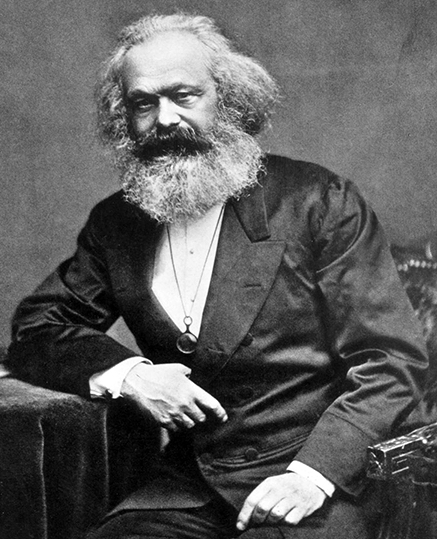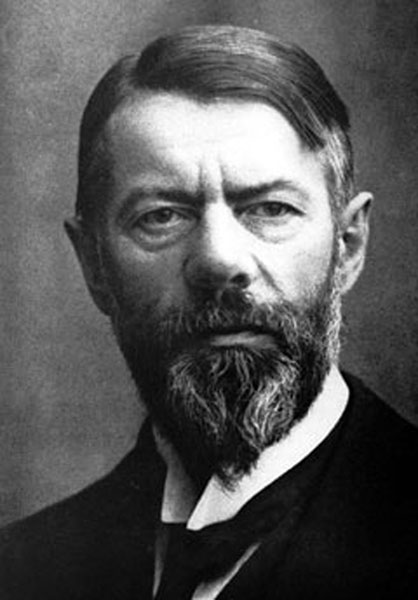The manuscript of the third volume of Das Kapital (Capital) breaks off at just the point where Karl Marx (1818-83) was going to provide a formal definition of class. It is quite clear that the essential aspect of class for Marx is ownership of the means of production (land in feudal economies, factories in industrial ones). Owners live off a surplus produced by those who labor on their farmland or in their factories.

In the famed slogan of The Communist Manifesto, history is a series of accounts of class struggles. Both the primitive and future communisms which Marx imagined, are outside of history, so there are no class differences in them: everyone belongs to a single, universal class.
Class consciousness, which is prerequisite to collective class action, depends upon ignoring distinctions within the owning or within the laboring class. Marx, the prophet of revolution, insisted that there are exactly two classes in capitalist societies. Marx, the analyst of capitalism in specific times and places, made finer distinctions than the dichotomy between owning and laboring classes. For instance, he distinguished grand from petite bourgeoisies, a lumpenproleteriat from the proleteriat. Moreover, he used “klasse” to refer to what have to be subsegments of the two classes of his abstract model.
For Marx, in contrast to most empirical research on stratification, classes are not defined by the amount of income. Income constrains if not altogether determining consumption, but equalizing income was not a goal of Marxist practice. Class position, for Marx, depended entirely on the source of income, not at all on the amount.

Max Weber (1864-1920) recognized objective class position (akin to Marx’s class in-itself) determined life chances, and even more than Marx had, he stressed the necessity of class-consciousness (class for-itself) if there is going to be any class action. Such recognition and such action are not universal: “‘Classes’ are not communities; they merely represent possible, and frequent bases for communal action.”
Weber also recognized that social status depends eventually on wealth, but he focused on strata within what is for Marx the non-laboring class, and on differences in lifeways rather than on ownership of the means of production. “‘Classes’ (klassen) are stratified according to their relations to the production and acquisition of goods; whereas “status groups’ (standen) are stratified according to the principles of their consumption of goods in special lifestyles.” Political groupings based on shared lifestyle are not at all the same as political groupings based on class. To further muddy any attempt to understand the importance of class struggle or status differences, in the post-industrial (service/information) era with gigantic government bureaucracies in both purportedly capitalist and purportedly communist states, an ever larger “new class” emerged, and some analysts have claimed that management has superseded ownership as the basis for power. Weber saw the imposition of bureaucratic, formal rationality as the decisive break in history rather than the transformation from one type of exploitation of labor (feudalism) to another (capitalism). The disenchantment of the world by formally rational procedures coincided to some degree with the rise of capitalism, but Weber insisted that it would persist through the transformation to socialism.
There is no obvious relationship between class struggle and homosexuality. For some persons, homosexual relationships may be an avenue to mobility between strata and even from one class to another. However, like most heterosexual marriages, most homosexual relationships are endogamous: the partners derive from the same class (and relatively similar strata). Short-term sexual relations are more likely to be exogamous than are ongoing relationships, and it is widely supposed that homosexual relations are more likely than heterosexual ones to cross class lines. Renting lower-class flesh and raising the earnings and status of protégés are neither uniquely heterosexual nor uniquely homosexual patterns, although a lesbian or gay man may put energy that parents put into raising the status of their children into helping a lover.
Given greater geographical and psychological distance between homosexuals and their families in industrial and postindustrial societies, they may be relatively freer to disregard family opinions about partners — especially transient sexual partners. Family pressure and internalized socialization nonetheless affect homosexual as well as heterosexual individuals who display an intent to share resources with someone “not of our kind,” whatever that kind is. Selection of long-term partners (homosexual or heterosexual) tends to be homophilious, despite the erotic attraction for transgressing class boundaries that fires many short-term liaisons.
Homosexual behavior and attempted sanctions against homosexual behavior have occurred in feudalist, capitalist, and socialist polities, as well as in “traditional” cultures (outside the history of class struggle in Marx’s view), so categorizing ownership of the means of production does not seem useful in explaining or predicting the extent or the type (social organization) of homosexual behavior, or the responses to one or another.
REFERENCE
Weber, Max. Economy and Society.Berkeley: University of California Press, 1978, pp. 926-40.
© 16 September 1998, Stephen O. Murray

